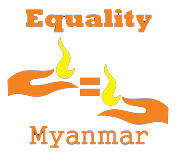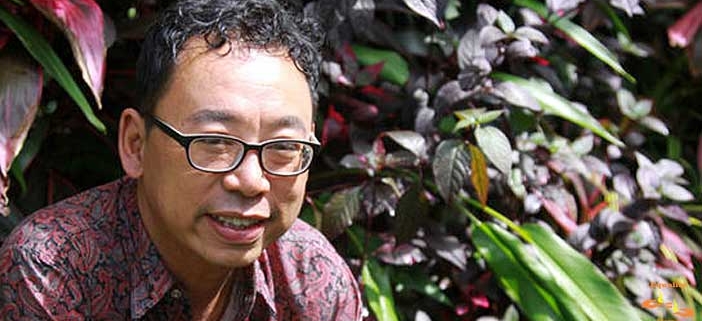–Not long ago we worked underground, now we are working openly. That makes a real difference, says the leader and founder of Equality Myanmar, Mr. Aung Myo Min.
After being based in Thailand for twelve years working on human rights issues in Myanmar, Aung Myo Min saw, due to the political changes in the country, an opportunity to bring his organization and his longstanding engagement to inside Myanmar. Originally called the Human Rights Education Institute of Burma (HREIB), the organization changed its name to Equality Myanmar.
“Our new name is more in line with our vision and long term direction; equal and fair human rights to all in Myanmar, Aung Myo Min explains.
But it is not an understatement to say that operating inside Myanmar with the original name “The Human Rights Education Institute of Burma” could cause challenges to the work; the new name is easier to adopt to for many of the target groups in Myanmar, not least the governmental bodies.
Equality Myanmar facilitates a broad range of human rights training and advocacy programs for grass root organizations, community leaders and institutions.
“We are dedicated to build a peaceful, democratic and just society where the people of Myanmar possess a critical human rights consciousness. We want people to enjoy political and social space to take action to promote dignity and to initiate rights-based solutions to social problems.”Aung Myo Min tells.
Facing new human rights issues
The content of Equality Myanmar’s work was also slightly changed. Although the focus is still on human rights issues, the changes in Myanmar towards a more open and democratic society has put other issues upon the agenda as well.
“Earlier we mostly focused on the violation of human rights concerning political prisoners, child soldiers and child labor, violence against women, trafficking and slavery – all very important issues and unfortunately still relevant issues to be highly aware of”, says Aung Myo Min, and continues:
“Now we have a slight change in our approach, and are focusing more on issues related to the new constitution and laws, like for instance land rights and freedom of speech. Other issues are labour rights and freedom of association.”
You have to be smart
Equality Myanmar is engaging with different people and civil society on many levels in the society, including youth organizations working on various political issues; grass roots organizations having social and health issues on their agenda; politicians and parliamentary members, to mention just a few.
They take a sensitive approach to their target groups using a different approach and even different language relating to whom they speak to.
“Before the democratic change the politicians for instance were much more ignorant concerning human rights issues. But now they know that people are watching them, and also the media is paying attention to violations of human rights. So it is also a matter of image and being up to date” Aung Myo Min explains, and elaborates:
“You have to be smart. When speaking to politicians about human rights you must have a more careful and general approach, and use their language. It is very important to have a personal engagement as well”.
230 new political prisoners in prison
Equality Myanmar is very concerned about the lack of rights for farmers that have their land confiscated by their government, commercial companies or for investments purposes. Since the new government was established, more than 230 persons have been imprisoned because of their protests against land confiscation.
“So in parallel with the last year’s liberalization process where many “traditional” political prisoners were released, we now see a new group of politically engaged people arrested”, says Aung Myo Min.
When asked about other critical human rights issues that Equality Myanmar are working on, he explains that trafficking and child labor remain important focus areas. Other issues are the practice of the police force and the violence against Muslims in the country.
“Many people have been contacting us considering the lack of response from the police to violence taking place, for example in the case of the recent clashes between Buddhists and Muslims”, Aung Myo Min continues.
Therefore Equality Myanmar have been engaging in the preparation of developing a new curriculum for police students, bringing in updated content on human rights, justice, gender and democracy issues.
A new way forward
Working openly has created a totally new space for human rights activists in Myanmar, which means that you have to think smart and strategically when proceeding in this work.
“The door is open so we have to push. But we have to push gently making sure that we are including more than excluding”, Aung Myo Min concludes.
The Human Rights Education Institute of Burma (HREIB), or Equality Myanmar (EM) has been facilitating a broad range of human rights training and advocacy programs for grass root organizations and community leaders. Established on the Thai-Myanmar border since 2000, HREIB transitioned its operations to within Myanmar last year. Norwegian Peoples Aid has been supporting HREIB/Equality Myanmar since spring 2013


 Equality Myanmar (EQMM) is a leading nongovernmental organization that organises a wide range of human rights education and advocacy programs, the documentation human rights violations, and provides emergency support for activists, human rights defenders, and their families. We work with a range of local civil society organizations, educators, activists, various local actors, and our programs and activities reach all states and regions in Myanmar.
Equality Myanmar (EQMM) is a leading nongovernmental organization that organises a wide range of human rights education and advocacy programs, the documentation human rights violations, and provides emergency support for activists, human rights defenders, and their families. We work with a range of local civil society organizations, educators, activists, various local actors, and our programs and activities reach all states and regions in Myanmar.
